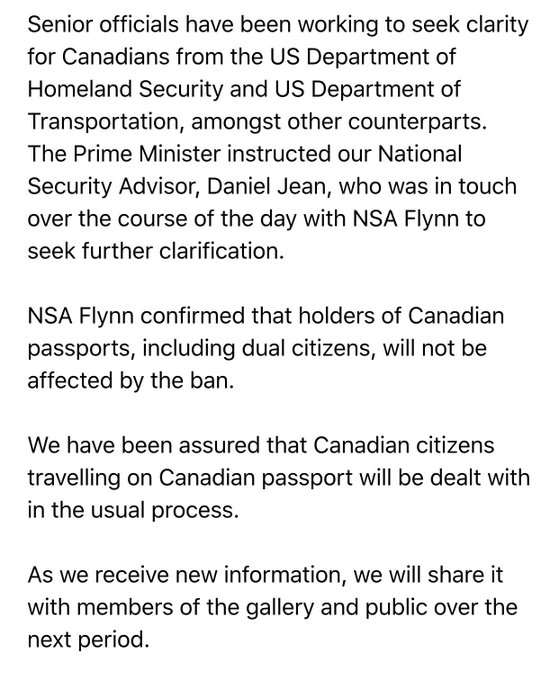Canadian citizens can travel freely to the United States despite U.S. President Donald Trump's sweeping immigration order that bans visitors from seven Muslim-majority countries, the Prime Minister's Office says.
Saturday's news came hours after the U.S. State Department told CBC News the 90-day travel ban covers all people who have a nationality or dual nationality with Iraq, Syria, Sudan, Iran, Somalia, Libya, and Yemen — which would include tens of thousands of Canadians.
- "We have been assured that Canadian citizens travelling on Canadian passport will be dealt with in the usual process," Kate Purchase, spokeswoman for the Prime Minister's Office, said in a statement.
The NDP has written to the Speaker of the House of Commons requesting an emergency debate on the immigration ban, a day before Parliament is set to re-open after a six-week break.
NDP Immigration critic Jenny Kwan said the ban will have "disastrous implications" for thousands of travellers, family members, students, business people and asylum-seekers.
"A ban against individuals based upon race, religion, or country of birth, implemented by our closest neighbour, cannot be tolerated," Kwan said in the letter. "Canadians cherish their role as global citizens and defenders of human rights and as their elected representatives it is our duty to respond to these extraordinary events."
Trump's executive order on Friday curbs travel to the U.S. for people coming from the seven Muslim-majority countries. In an email to CBC News earlier on Saturday, a spokesperson for the U.S. State Department said: "Beginning January 27, 2017, travellers who have nationality or dual nationality of one of these countries will not be permitted for 90 days to enter the United States or be issued an immigrant or nonimmigrant visa."
"Those nationals or dual nationals holding valid immigrant or nonimmigrant visas will not be permitted to enter the United States during this period."
It's not clear at this point whether the ban affects dual nationals who have citizenship with one of the banned countries and another country outside of Canada.
At the Los Angeles International Airport, people protest U.S. President Donald Trump's sweeping executive order barring refugees and travellers from seven Muslim-majority countries. Canada says its citizens will not be affected. (Patrick T. Fallon/Reuters)
'We're not terrorists'
Before the PMO issued the statement of assurance to Canadian dual citizens, Leena Yousefi, a family and immigration lawyer in Vancouver, told CBC News she is "deeply saddened and offended" by Trump's order.
Yousefi, 34, said her family immigrated to Canada in 1996 and she's only returned to Iran once to visit family and hasn't bothered to update her Iranian passport.
She said she often travels to the U.S. and was hoping to start a new law firm there because she often works with Americans looking to immigrate to Canada.
"We're just completely shocked," she said. "We have family in the United States. We've never had a problem with American people."
"I think all the Iranian-Canadian professionals ... need to speak up," she said. "We're not terrorists, at all."
Families separated
Plenty of people in Canada are still affected by the executive order.
Mehran Shirazi, a PhD engineering student at Simon Fraser University and a permanent resident in Canada, said he doesn't know when he will be able to see his brother in New York City, who is awaiting a green card for the U.S. Both were born in Iran.
- "We'd hoped to see each other but it's not going to work because he cannot come here because then he cannot come back to the U.S. and I cannot visit him," Shirazi said.
Shirazi's parents haven't seen his brother in six years and had planned to visit to New York this spring.
"Now they cannot do that. They don't know when, if at all, they can see him again," he said.
2011 National Household Survey
According to the 2011 National Household Survey from Statistics Canada, the latest survey available, there were over 35,000 Canadians in 2011 who shared citizenship with the countries banned.
- 1,655 with Somalia.
- 5,590 with Iraq.
- 21,610 with Iran.
- 1,505 with Sudan.
- 210 with Yemen.
- 4,080 with Syria.
- 535 with Libya.
The survey also showed there were 74,550 people in Canada from those countries who do not have citizenship in Canada:
- 5,115 from Somalia.
- 19,030 from Iraq.
- 36,950 from Iran.
- 4,005 from Sudan.
- 830 from Yemen.
- 5,375 from Syria.
- 3,245 from Libya.
The survey was compiled before Canada's commitment to resettle tens of thousands of Syrian refugees in 2015.
A federal judge in New York on Saturday night barred U.S. from deporting travellers with valid visas covered by Trump order, which the American Civil Liberties Union says will affect 100 to 200 people detained at airports. It's unclear how many are Canadian.
Source: http://www.cbc.ca/news/canada/canadian-affected-trump-travel-ban-refugees-immigrants-1.3957059


No comments:
Post a Comment